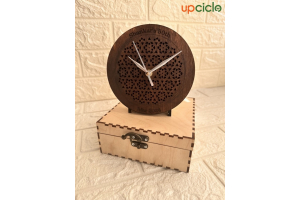2021 - The Year of Sustainable Fashion
There are consequences to everything. No matter how responsibly you dispose of your waste, you do not have the control over where it goes and where it finally ends up. What if, instead of disposing your waste responsibly, you could just avoid generating waste altogether? As good as it sounds, it is near impossible to execute, and it is an idealistic expectation - which is why we can at least control the amount of plastic we use on a regular basis. The changes you make in adopting environmental sustainability and eco-friendly practices will inevitably make you healthier, and help you generate as little waste as possible. Buy rice and other grains from local vendors and take your own jar to the shop when you do so. Avoid accumulating food items and freezing them for long periods of time, consume everything as fresh as you can. Buy daily use commodities like hand wash in larger quantities, which come in the form of refill bags. You can even take the small bit of extra effort to ensure no harmful chemicals are being used in your daily routine, by checking the ingredients on the packaging of cosmetic products and toiletries you use.
How often do you buy juice in a tetra pak? Are you watchful of the small plastic cover in which the straw comes? Do you segregate your waste at home? Do you end up buying that plastic bag at the supermarket every time? These are questions you can consciously ask yourself everyday and implement healthier alternatives. If you like to switch up your wardrobe often, do you donate your clothes to charity or just throw out what you can’t wear anymore? Did you know that you could turn your old clothes into all kinds of utility and display pieces, which actually look great and serve their purpose beautifully? Your clothes can end up as placemats, coasters, bags, or you could take up the personal project on yourself to make a beautifully patched bedsheet from scraps of your old clothes! Jute bags like these have been made entirely from recycled material and continue to be sturdy, have ample storage for all your daily needs as well as look great! This wallet, too, has been made from 100% recycled jute material - something to rather be proud of, when you can say you gave the material an extended life after it had already been used to the fullest extent.

Your skin will feel a lot more relieved when you opt for fabrics like linen, cotton, hemp, khadi over rayon, nylon, polyester and spandex. The organic materials will always last longer, feel more comfortable and stay rather fresh while synthetic fabrics will catch on body odours and stains. Nowadays there is also bamboo being used extensively in the textile industry, which is a great benefit in reducing the carbon footprint of manufacturing processes. Footwear is another industry which generates large amounts of waste and also uses a lot of power. Millions of shoes are thrown away each year, ending up in landfills and taking at least 40 years to decompose. Instead, these sandals are made from 100% discarded and remolded cork with rewashed and dyed canvas. Cork is similar to memory foam, breathable, good on skin, and will never cause discomfort, shoebites or allergies. At the same time, you can be confident of the fact that some of the proceeds from your purchase will go to charity and help those in need.

Recycled footwear is now a global trend, and a step towards helping reduce waste generated from disposed footwear. Ballet dancers, after attaining professional mastery, can go to the extent of changing shoes on a daily basis, which also amounts to long periods of time to decompose. These shoes have been made using discarded shoe soles which have been melted, reformed and remolded, with pre-washed canvas fabric - breathable, soft, and comes in a recycled paper packaging and a reusable cotton bag. Collectively, we can all take the initiative to buy durable footwear, recycled footwear, and ensure that we push fewer shoes to the landfills. Eventually, we can all push for less carbon footprint, more comfort, sustainable production of fashion in our lifestyle for a positive outcome in the long run. Let's ensure that the subsequent generations have something to thank us for and we can make them happy.




